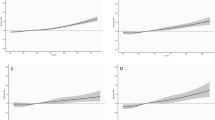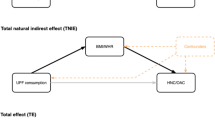Abstract
Little is known about the effects of diet after breast cancer diagnosis on survival. We prospectively examined the relation between post-diagnosis dietary factors and breast cancer and all-cause survival in women with a history of invasive breast cancer diagnosed between 1987 and 1999 (at ages 20–79 years). Diet after breast cancer diagnosis was measured using a 126-item food frequency questionnaire. Among 4,441 women without a history of breast cancer recurrence prior to completing the questionnaire, 137 subsequently died from breast cancer within 7 years of enrollment. Hazard ratios (HR) and 95% confidence intervals (CI) were estimated for intake of macronutrients as well as selected micronutrients and food groups from Cox proportional hazards regression models. After adjustment for factors at diagnosis (age, state of residence, menopausal status, smoking, breast cancer stage, alcohol, history of hormone replacement therapy), interval between diagnosis and diet assessment, and at follow-up (energy intake, breast cancer treatment, body mass index, and physical activity), women in the highest compared to lowest quintile of intake of saturated fat and trans fat had a significantly higher risk of dying from any cause (HR = 1.41, 95% CI = 1.06–1.87, P trend = 0.03) for saturated fat; (HR = 1.78, 95% CI = 1.35–2.32, P trend = 0.01) for trans fat intake. Associations were similar, though did not achieve statistical significance, for breast cancer survival. This study suggests that lower intake of saturated and trans fat in the post-diagnosis diet is associated with improved survival after breast cancer diagnosis.
Similar content being viewed by others
Abbreviations
- BMI:
-
Body mass index
- CI:
-
Confidence interval
- CWLS:
-
Collaborative Women’s Longevity Study
- FFQ:
-
Food frequency questionnaire
- HR:
-
Hazard ratio
- MET:
-
Metabolic equivalent of task
- NHS:
-
Nurses’ Health Study
- WHEL:
-
Women’s Healthy Eating and Living
- WINS:
-
Women’s Intervention Nutrition Study
References
Thiebaut AC, Kipnis V, Chang SC, Subar AF, Thompson FE, Rosenberg PS, Hollenbeck AR, Leitzmann M, Schatzkin A (2007) Dietary fat and postmenopausal invasive breast cancer in the National Institutes of Health-AARP Diet and Health Study cohort. J Natl Cancer Inst 99(6):451–462. doi:99/6/451[pii]10.1093/jnci/djk094
Chlebowski RT, Blackburn GL, Thomson CA, Nixon DW, Shapiro A, Hoy MK, Goodman MT, Giuliano AE, Karanja N, McAndrew P, Hudis C, Butler J, Merkel D, Kristal A, Caan B, Michaelson R, Vinciguerra V, Del Prete S, Winkler M, Hall R, Simon M, Winters BL, Elashoff RM (2006) Dietary fat reduction and breast cancer outcome: interim efficacy results from the Women’s Intervention Nutrition Study. J Natl Cancer Inst 98(24):1767–1776. doi:98/24/1767[pii]10.1093/jnci/djj494
Pierce JP, Natarajan L, Caan BJ, Parker BA, Greenberg ER, Flatt SW, Rock CL, Kealey S, Al-Delaimy WK, Bardwell WA, Carlson RW, Emond JA, Faerber S, Gold EB, Hajek RA, Hollenbach K, Jones LA, Karanja N, Madlensky L, Marshall J, Newman VA, Ritenbaugh C, Thomson CA, Wasserman L, Stefanick ML (2007) Influence of a diet very high in vegetables, fruit, and fiber and low in fat on prognosis following treatment for breast cancer: the Women’s Healthy Eating and Living (WHEL) randomized trial. JAMA 298(3):289–298. doi:298/3/289[pii]10.1001/jama.298.3.289
Kwan ML, Weltzien E, Kushi LH, Castillo A, Slattery ML, Caan BJ (2009) Dietary patterns and breast cancer recurrence and survival among women with early-stage breast cancer. J Clin Oncol 27(6):919–926. doi:JCO.2008.19.4035[pii]10.1200/JCO.2008.19.4035
McTiernan A, Irwin M, Vongruenigen V (2010) Weight, physical activity, diet, and prognosis in breast and gynecologic cancers. J Clin Oncol 28(26):4074–4080. doi:JCO.2010.27.9752[pii]10.1200/JCO.2010.27.9752
Nelson N (2008) Dietary intervention trial reports no effect on survival after breast cancer. J Natl Cancer Inst 100(6):386–387. doi:djn069[pii]10.1093/jnci/djn069
Holick CN, Newcomb PA, Trentham-Dietz A, Titus-Ernstoff L, Bersch AJ, Stampfer MJ, Baron JA, Egan KM, Willett WC (2008) Physical activity and survival after diagnosis of invasive breast cancer. Cancer Epidemiol Biomarkers Prev 17(2):379–386. doi:1055-9965.EPI-07-0771[pii]10.1158/1055-9965.EPI-07-0771
Titus-Ernstoff L, Longnecker MP, Newcomb PA, Dain B, Greenberg ER, Mittendorf R, Stampfer M, Willett W (1998) Menstrual factors in relation to breast cancer risk. Cancer Epidemiol Biomarkers Prev 7(9):783–789
Sprague BL, Trentham-Dietz A, Newcomb PA, Titus-Ernstoff L, Hampton JM, Egan KM (2007) Lifetime recreational and occupational physical activity and risk of in situ and invasive breast cancer. Cancer Epidemiol Biomarkers Prev 16(2):236–243. doi:16/2/236[pii]10.1158/1055-9965.EPI-06-0713
Willett WC, Sampson L, Stampfer MJ, Rosner B, Bain C, Witschi J, Hennekens CH, Speizer FE (1985) Reproducibility and validity of a semiquantitative food frequency questionnaire. Am J Epidemiol 122(1):51–65
Calle EE, Terrell DD (1993) Utility of the National Death Index for ascertainment of mortality among cancer prevention study II participants. Am J Epidemiol 137(2):235–241
Willett W (1998) Nutritional epidemiology. Monographs in epidemiology and biostatistics, vol 30, 2nd edn. Oxford University Press, New York
Wright JD, Kennedy-Stephenson J, Wang CY, McDowell MA, Johnson CL (2004) Trends in intake of energy and macronutrients—United States, 1971-2000. CDC Morbid Mortal Wkly Rep 53(4):80–82
Allison DB, Egan SK, Barraj LM, Caughman C, Infante M, Heimbach JT (1999) Estimated intakes of trans fatty and other fatty acids in the US population. J Am Diet Assoc 99 (2):166–174; quiz 175–166. doi:S0002-8223(99)00041-3[pii]10.1016/S0002-8223(99)00041-3
Michels KB, Mohllajee AP, Roset-Bahmanyar E, Beehler GP, Moysich KB (2007) Diet and breast cancer: a review of the prospective observational studies. Cancer 109(12 Suppl):2712–2749. doi:10.1002/cncr.22654
Dal Maso L, Zucchetto A, Talamini R, Serraino D, Stocco CF, Vercelli M, Falcini F, Franceschi S (2008) Effect of obesity and other lifestyle factors on mortality in women with breast cancer. Int J Cancer 123(9):2188–2194. doi:10.1002/ijc.23747
Barnett GC, Shah M, Redman K, Easton DF, Ponder BA, Pharoah PD (2008) Risk factors for the incidence of breast cancer: do they affect survival from the disease? J Clin Oncol 26(20):3310–3316. doi:26/20/3310[pii]10.1200/JCO.2006.10.3168
Reding KW, Daling JR, Doody DR, O’Brien CA, Porter PL, Malone KE (2008) Effect of prediagnostic alcohol consumption on survival after breast cancer in young women. Cancer Epidemiol Biomarkers Prev 17(8):1988–1996. doi:1055-9965.EPI-07-2897[pii]10.1158/1055-9965.EPI-07-2897
Rock CL, Demark-Wahnefried W (2002) Nutrition and survival after the diagnosis of breast cancer: a review of the evidence. J Clin Oncol 20(15):3302–3316
Kellen E, Vansant G, Christiaens MR, Neven P, Van Limbergen E (2009) Lifestyle changes and breast cancer prognosis: a review. Breast Cancer Res Treat 114(1):13–22. doi:10.1007/s10549-008-9990-8
Fink BN, Gaudet MM, Britton JA, Abrahamson PE, Teitelbaum SL, Jacobson J, Bell P, Thomas JA, Kabat GC, Neugut AI, Gammon MD (2006) Fruits, vegetables, and micronutrient intake in relation to breast cancer survival. Breast Cancer Res Treat 98(2):199–208. doi:10.1007/s10549-005-9150-3
Mozaffarian D, Katan MB, Ascherio A, Stampfer MJ, Willett WC (2006) Trans fatty acids and cardiovascular disease. N Engl J Med 354(15):1601–1613. doi:354/15/1601[pii]10.1056/NEJMra054035
Mozaffarian D, Pischon T, Hankinson SE, Rifai N, Joshipura K, Willett WC, Rimm EB (2004) Dietary intake of trans fatty acids and systemic inflammation in women. Am J Clin Nutr 79(4):606–612
Trichopoulou A, Kouris-Blazos A, Wahlqvist ML, Gnardellis C, Lagiou P, Polychronopoulos E, Vassilakou T, Lipworth L, Trichopoulos D (1995) Diet and overall survival in elderly people. BMJ 311(7018):1457–1460
Willett WC, Hu FB (2007) The food frequency questionnaire. Cancer Epidemiol Biomarkers Prev 16(1):182–183. doi:16/1/182[pii]10.1158/1055-9965.EPI-06-0843
Willett WC, Hu FB (2006) Not the time to abandon the food frequency questionnaire: point. Cancer Epidemiol Biomarkers Prev 15(10):1757–1758. doi:1055-9965.EPI-06-0388[pii]10.1158/1055-9965.EPI-06-0388
Kristal AR, Potter JD (2006) Not the time to abandon the food frequency questionnaire: counterpoint. Cancer Epidemiol Biomarkers Prev 15(10):1759–1760. doi:1055-9965.EPI-06-0727[pii]10.1158/1055-9965.EPI-06-0727
Berry DA, Cirrincione C, Henderson IC, Citron ML, Budman DR, Goldstein LJ, Martino S, Perez EA, Muss HB, Norton L, Hudis C, Winer EP (2006) Estrogen-receptor status and outcomes of modern chemotherapy for patients with node-positive breast cancer. JAMA 295(14):1658–1667. doi:295/14/1658[pii]10.1001/jama.295.14.1658
Acknowledgments
This research was supported by grants from the Susan G. Komen Breast Cancer Foundation (POP0504234) and the National Cancer Institute, National Institutes of Health, and Department of Health and Human Services (CA47147, CA47305, CA69664, and CA94880).
Conflicts of interest
None.
Author information
Authors and Affiliations
Corresponding author
Rights and permissions
About this article
Cite this article
Beasley, J.M., Newcomb, P.A., Trentham-Dietz, A. et al. Post-diagnosis dietary factors and survival after invasive breast cancer. Breast Cancer Res Treat 128, 229–236 (2011). https://doi.org/10.1007/s10549-010-1323-z
Received:
Accepted:
Published:
Issue Date:
DOI: https://doi.org/10.1007/s10549-010-1323-z




